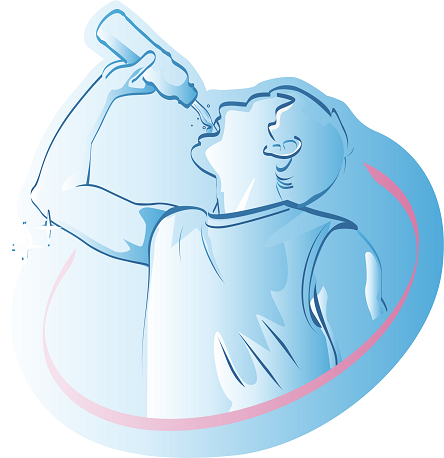To quench thirst and alleviate dehydration, you can follow these steps:
- Drink water: Water is the most effective and natural way to quench thirst. Take small sips or drink water in moderation rather than gulping down large amounts at once.
- Opt for electrolyte-rich beverages: In addition to water, you can consider drinking electrolyte-rich beverages like sports drinks or coconut water. These drinks contain essential minerals and electrolytes that can help replenish the body's fluids and electrolyte balance.
- Consume hydrating foods: Certain fruits and vegetables have high water content and can help hydrate your body. Examples include watermelon, cucumber, oranges, strawberries, and lettuce. Incorporating these foods into your diet can contribute to your overall hydration.
- Avoid or limit caffeine and alcohol: Beverages like coffee, tea, and alcohol can have a diuretic effect, causing increased urine production and potentially worsening dehydration. If you're trying to quench thirst, it's best to limit your intake of these substances.
- Stay in a cool environment: High temperatures and excessive sweating can lead to increased fluid loss and dehydration. Seek a cool and shaded area or use fans or air conditioning to maintain a comfortable temperature and reduce excessive sweating.
- Pace yourself: If you're engaged in physical activity or exertion, try to pace yourself to avoid excessive sweating and dehydration. Take breaks, rest in shaded areas, and replenish your fluids regularly.
- Monitor your urine color: Pay attention to the color of your urine, as it can be an indicator of hydration levels. Pale yellow urine generally indicates good hydration, while dark yellow or amber-colored urine may indicate dehydration. Aim for lighter urine color as a sign of proper hydration.
- Listen to your body: Thirst is your body's way of signaling that it needs fluids. Pay attention to your body's cues and drink when you feel thirsty. Additionally, monitor other signs of dehydration, such as dry mouth, fatigue, dizziness, or reduced urine output.
It's important to note that the severity of dehydration can vary, and severe cases may require medical attention. If you experience persistent or severe dehydration symptoms, it's advisable to consult a healthcare professional for appropriate guidance and treatment.


